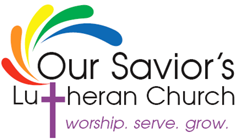Sunday, January 19, 2020 – Epiphany 2
January 19, 2020
Epiphany 2 2020
1 Corinthians 1:1-9
Our Savior’s La Crosse
The community’s history was one of war and destruction. At one point, they were completely destroyed, their streets burned and buildings razed; the ruins sat for almost 100 years. At the time of the destruction the men of the community were killed, the women and children were sold into slavery.
Decades later, the emperor issued a decree re-establishing them as a colony. The community was re-settled by a melting pot of Europeans and Asians. Many of the settlers were Jewish.
The community was strategically located on an isthmus where two ports could be controlled. As it grew, the community became prosperous, the fourth most influential metropolis in the Roman Empire. Only Rome, Alexandria, and Ephesus were bigger communities with more power.
I’m talking about Corinth; Corinth as it was for two centuries before Jesus and in the early days after Jesus. I’m talking about Corinth, the community Paul visited, wrote letters to, and helped establish a Christian community in.
Corinth was the capital city of the province of Achaia. A part of the Roman Empire, the local Roman Authority had his residence in Corinth.
Corinth was a center of politics, a center of trade, and thus a center for employment. Immigrants settled in Corinth. People from all over the Mediterranean world brought with them diverse cultural practices. There were diverse social customs and religious beliefs. There were temples dedicated to a variety of pagan gods.
Corinth was notorious for its citizens having lax morals. Many of the more “questionable” moral behaviors were rooted in religious traditions. There were pagan cult rituals, fertility rituals and magic. For example, there was a temple in Corinth dedicated to the goddess Aphrodite that was said to have as many as 1,000 priestess-prostitutes in residence.
Corinth.
The Apostle Paul’s first contact with Corinth was in 50 A.D. As a guest of Aquila and Priscilla, Paul went to the synagogue in Corinth, telling people about Jesus. He was an aggressive missionary. He was enthusiastic. He was convincing. His energy threatened synagogue leaders, who felt their faith was being challenged. They not only asked Paul to leave the synagogue, they asked him to leave the area. So he did. But Paul took his converts with him, including the president of the synagogue and others associated with the temple.
Paul did not limit his ministry to Hebrew people. He ministered the Gentiles who were equally as intrigued by Paul’s words.
Paul and those who followed his teachings formed a community church, integrating Hebrew and Gentile, slaves and wage-earners, wealthy civic leaders and the poor.
As wonderful as the diversity of the church in Corinth was, their diversity brought with it some problems. Folks were dividing themselves into smaller groups. They were aligning themselves with different leaders. They were jockeying for power. Things got ugly. They wrote to Paul, asking for help.
Paul wrote to the church. Our reading from 1 Corinthians is the introduction to one of his letters. Addressing a community of faith full of division, full of anger, with smalls groups bickering and struggling, Paul wrote:
“I give thanks to my God always for you…” (1 Cor. 1:4).
Paul did not write “I give thanks to my God for some of you…” Paul did not write “I give thanks to my God for those of you who align yourselves with me…” Paul did not say “Those of you who are aligning yourselves with Peter or with Apollos better get back on track or you’re out of here…”
Paul wrote “I give thanks to my God always for you because of the grace of God that has been given you in Christ Jesus…” (1 cor. 1:4-5).
His words are a lesson on how to live in community with one another, even when in the midst of in-fighting or struggle.
You disagree with me? I give thanks to my God for you, because of the grace of God that has been given to you. And you. And you. And you.
Imagine beginning every argument with those words. Whether it is an argument at home or an argument at work or an argument at school or an argument at your favorite bar, or an argument online, or an argument at church.
“I give thanks to my God always for you…”
“You have been given God’s gift of grace, just as I have.”
Now, what was it we were talking about?
Those words don’t make the disagreement go away. But they center people on what’s most important for everyone, always. God loves everyone equally. God saves all people, most assuredly. God forgives all of us our sins.
We live in a time when conflict pervades everything. Politics. Families. Towns. States. Nations. Chat groups. Twitter threads.
I’m inviting myself, as well as each of you, to pause before you engage in the conflict. Think for a moment. God loves that other person just as God loves you. Before you speak, before you write, before you tweet—hold that other person or persons in your heart. And tell them:
“I give thanks to my God always for you…”
Amen.
(Information on Corinth from “Corinth” by J. Finegan in The Interpreter’s Dictionary of the Bible, volume 1, pp. 682-684).

